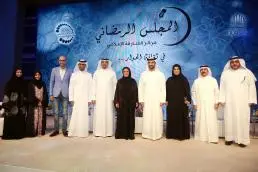PHOTO
UAE-Sharjah/Sharjah Media Centre: June 24, 2015
The fourth Ramadan Majlis, organised by Sharjah Media Centre (SMC), continued yesterday (Tuesday) with a session titled "The Requirements of Transformation to Smart Government under Technological Dominance" and discussed issues related to the UAE government's vision to provide 24-hour services to the public.
The session was attended by Sheikh Sultan bin Ahmed Al Qasimi, Chairman of SMC; Sheikh Mohammed bin Ahmed Al Qasimi, Director General of the Office of the Chairman of Sharjah Oil Council; Sheikh Mohammed bin Humaid Al Qasimi, Director of the Sharjah Department of Statistics and Community Development; HE Dr Khalid Omar Al Midfa, Director General of Sharjah Media Corporation and HE Osama Samra, Director of SMC, as well as senior officials from the public and private sectors, representatives of the diplomatic corps in the UAE, intellectuals and media figures.
The session was sponsored by the Government Communication Office at the General Secretariat of the Ministry of Cabinet Affairs and moderated by Ali Obaid Al Hamli, News Director at Dubai Media Incorporated.
Opening the session, Al Hamli said the UAE launched its e-government initiative in 2001 and launched the smart government in 2013, with a two-year period for government officials to fulfil the requirements of smart government and tackle the technological advancement in all areas and services.
Sheikh Sultan bin Ahmed Al Qasimi underlined the significance of rapid technological developments which led to governments utilising the latest technology to provide their services around the clock, and he highlighted the achievements already made by the UAE in e-government.
Al Hamli said the leadership of the UAE has a vision. He explained: "the vision for future government is a government that does not sleep and provides 24/7 services, and works 365 days a year. It is a government that is hospitable like hotels, fast in its transactions and strong in its procedures. It is a creative government that responds quickly to changes and innovates solutions to all challenges." He added that the smart government model works to fulfil ambitions and looks forward confidently to satisfying the public.
Dr Mansour Al Awar, Chancellor of Hamdan bin Mohammed e-University and Chairman of the Board of Trustees of the Unesco Institute for Information Technologies in Education (IITE) said the use of radio by His Highness Sheikh Dr Sultan bin Muhammad Al Qasimi, UAE Supreme Council Member and Ruler of Sharjah, to listen and reply to citizens has constituted a new form of government and laid strong foundations between the public and the government. He said, "The fundamental premise of smart government is communicating with the public and listening to them. The overall aim is to serve people effectively, listen to them and include them in decision-making, with a focus on providing the necessary legislation and qualified human resources to provide reliable and outstanding services to the public."
HE Sheikha Lubna Al Qasimi said that the UAE government aims to please and is working towards being a government that does not sleep. Sheikha Lubna said: "Smart government helps strengthen competitiveness, increase transparency and give some kind of justice, bringing satisfaction to community members and attracting investors. Our sophisticated infrastructure and modern telecommunication network have contributed to the existence of our smart government. Technological advancement has granted community members a wider margin of freedom in obtaining services at a more convenient time and place, and provided greater opportunities for learning, research and accessing information."
Highlighting the importance of information security, Sheikh Khalid bin Ahmed Al Qasimi said the Department of Information and e-Government of Sharjah has been keen to recruit highly qualified technical staff specialised in protecting information security, adding: "This is to ensure the full protection of the public's transactions and the confidentiality of their personal data so they are fully protected against unauthorised access."
Sheikh Khalid highlighted the need for ongoing research into new and innovative means to protect personal and official information and called on government bodies to spend more on electronic security in view of rapid technological developments.
Bahraini Information Minister, HE Issa bin Abdul Rahman Al Hammadi said that the objective of governments is to achieve a better life for people, and thus the content of official media must be up-to-date and live up to the public's needs and demands. He said: "State media needs to focus on the content and the message it conveys, and ensure that whatever is announced to the public is based on facts in order to have long-term impact and credibility, while building trust. The GCC countries used to import ideas and technologies for development, but today they are among the first to adopt smart government applications, thanks to investment in providing the best for their citizens."
He called for greater cooperation and coordination between the GCC governments and organisations in the area of information exchange and stressed the need to inspire young people to become entrepreneurs and to shift from oil-reliant economies to creative idea-based ones.
The Ramadan Majlis, which was held for the first time in 2012, is one of the annual distinctive initiatives undertaken by Sharjah Media Centre and has become a highlight of the Ramadan calendar due to its role in promoting the culture of dialogue. The Majlis allows the audience to meet, and learn more about, influential figures who have an impact on various aspects of life and listen to their views and opinions about topical issues.
-Ends-
For further inquiries and assistance, kindly contact:
Sharjah Media Centre
Media and Communications Arm of the Government of Sharjah
Jawaher Al Naqbi
L. +971 6 5123 415
E. jawaher.alnaqbi@sharjahmedia.ae
Fadia Daouk
National Network Communications (NNC)
Mob: +971 52 617 2111
© Press Release 2015




















